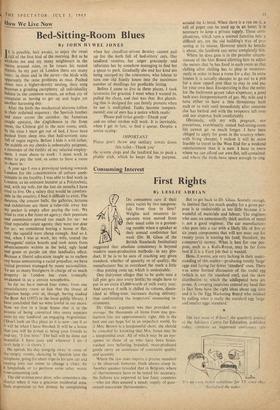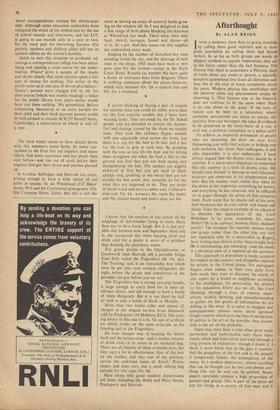Consuming Interest
First Rights
By LESLIE ADRIAN One 'dairyman alleges that to be quite sure a full pint gets into every bottle,' te might have to put in an extra 0,000-worth of milk every year. And anyway if milk is chilled its volume, dimin- ished at filling-time, increases during delivery, thus confounding the inspectors' measuring in- struments.
Dr. Glass's argument was that provided, on average, the thousands of items from one pro- duction line are approximately right, this is the best one can hope for in an imperfect world. So if Mrs. Brown is a teaspoonful short, she should be consoled by knowing that Mrs. Jones may be a teaspoonful over. All of which may be an eye- opener to those of us who have been brain- washed into believing branded, mass-produced goods carry an assurance of consistent quality and quantity.
Where the law does require a precise standard to be observed, however, fresh abuses creep in. Another speaker revealed that in Belgium, where all thermometers have to be tested for accuracy, the failures are exported to less fussy countries --who are thus assured a steady supply of guar- anteed inaccurate thermometers.
But to get back to Dr. Glass. Soundly enough, he insisted that too much quality for a given pur- pose is as undesirable as too little because it is wasteful of materials and labour. The engineer who uses an unnecessarily thick section a metal is not a good engineer. The car manufacturer who puts into a car with a likely life of five or six years components that will not wear out for twenty years is wasting his (and, therefore, the consumer's) money. What is best for one pur- pose, such as a Rolls-Royce, may be far from best if it is a Ford job that is wanted.
Hens, it seems, are.very lacking in their under- standing of this,matter—producing mostly 'large' eggs and laying farfewer 'standard' ones. There was some learned discussion of the nodal egg (which is not the 'standard one), and the skew distribution to which the addlepated hens are prone. A creeping suspicion entered my head that in fact hens have the right ideas about egg sizes and it is the Egg Marketing Board who mislead by calling what is really the standard egg 'large' and smaller eggs 'standard.'
The new issue of Where?, the quarterly journal of the Advisory Centre for Education, published today, contains an important cautionary tale 'It's an cven better substitute for TV since the:: fhwridised the water.' about correspondence courses for eleven-year- olds. Although some education authorities have mitigated the strain of the written test by the use of school records and interviews, and the LCC is going to use records only in a year or two, for the most part the harrowing business (for parents, teachers and children alike) still has its cyclical effects on the nation's families.
Quick to turn this situation to profitable ad- vantage a correspondence college has been adver- tising and running a cram course for the under- twelves. Where? gives a sample of the results and shows clearly that some parents spent a fair sum of money for nothing. The writer of the article sums up in one case of eleven-plus failure : 'Gwen's parents were charged £18 2s. 6d. for their course [which was mostly reading]; a ticket for the public library four years earlier would have cost them nothing.' My parenthesis. Before committing themselves to an extra burden for their child and their bank account parents would be well advised to consult ACE (57 Russell Street, Cambridge), a subscription to which is only £1 a year.
The hard winter seems to have played havoc with this summer's sweet herbs. So many suc- cumbed to the frost that my supplier, and many others, had more customers and less plants than ever before—and ran out of stock before their regulars had got their boxes and patches planted up.
In London Selfridges and Harrods are enter- prising enough to keep a wide choice of cut, herbs in season. So do Wholefood (112 Baker Street, WI) and the Continental greengrocer (35a Old Compton Street, Soho). But this is not the
same as having an array of assorted herbs grow- ing on the window sill. So I was delighted to find a fine range of herb plants blocking the doorway at Wholefood last week. There were, inter alit:. basil, chervil, tarragon, fennel and chives—all at Is. 3d. a pot. And they assure me that supplies are replenished every week.
Judging by the number of shrivelled bay trees standing round the city, and the shortage of new ones in the shops, 1963 must have been a very poor year for the wicked—except in the Earls Court Road. Rassells (at number 80) have quite a forest of miniature bays from Belgium. There is nothing miniature about the prices however, which vary between 65s. for a conical tree and 95s. for a mophead.
If you're thinking of buying a pair of sandals for summer wear you could do rather worse than try the foot exercise sandals that I have been wearing lately. They are made by the Dr. Scholl people and are intended to correct the discom- fort and damage caused by the shoes we usually wear. They look like ordinary flipper sandals with one adjustable strap across the front, but there is a cup for the heel to fit into and a bar for the toes to grip at each step. By gripping with the toes as you lift the foot and by letting them straighten out when the foot is flat on the ground you find that you are both easing and strengthening the feet. The sandals are slightly awkward at first but you get used to them quickly and, speaking as one whose feet are not exactly my best point, they certainly do for me what they are supposed to do. They are made of beech wood and have, a rubber sole. Children's sizes cost 39s. 9d., women's 48s. (with flat heels) and 54s. (raised heels) and men's sizes are 48s.
I know that the reaction to any article on the trappings of hot-weather living is more likely than not to be a horse laugh. But it is just pos- sible that between now and September there will Ix the occasional day when keeping food and drink cool for a picnic is more of a problem than keeping the picnickers warm.
For grand picnics in the Glyndebourne or Goodwood class Harrods sell a portable fridge from Italy called the Frigorifero (£6 19s. 6d.). The 'freezing' unit is an extractable box • which must be put into your resident refrigerator the night before the picnic and transferred to the portable one just before you set out.
The Frigorifero has a strong carrying handle, is large enough to carry food for at least six alfresco diners, and tall enough to hold a bottle of white Burgundy. But it is too short by half an inch to take a bottle of Hock or Moselle.
More than two inches taller and almost £2 cheaper is the elegant ice-box from Denmark sold by Pindisports (14 Holborn, EC1). The cool- ing device in this case is a 4s. 5d. can of artificial ice which works on the same principle as the freezing unit in the Frigorifero.
An even cheaper way of keeping the butter hard and the lettuce crisp—and a modest amount of drink cool—is to invest in an insulated bag. There are all manner of these available now, but they vary a lot in effectiveness. One of the best on the market, and also one of the prettiest, carries the awkward name of `Ezetil.' Prices, shapes "and sizes vary, but a small oblong bag suitable for two costs 34s. 6d.
Most shops with good outdoor departments sell them, including the Army and Navy Stores, Pindisports and Harrods.







































 Previous page
Previous page